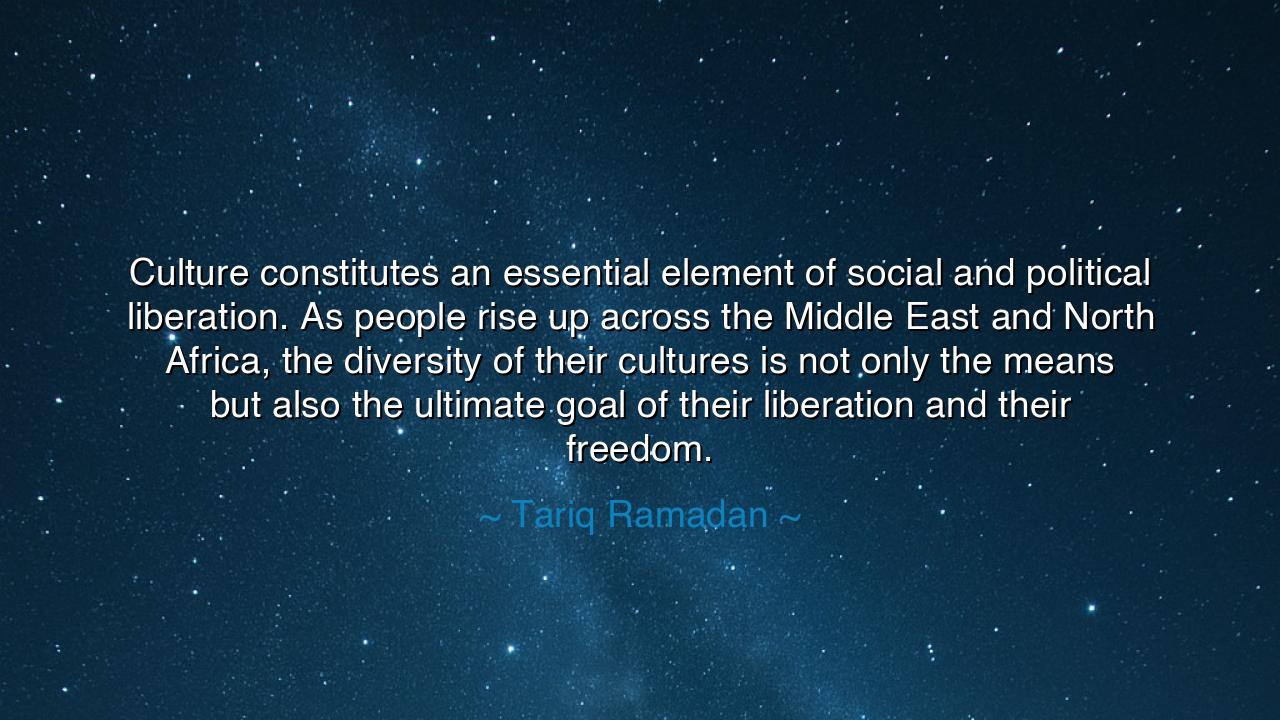
Culture constitutes an essential element of social and political
Culture constitutes an essential element of social and political liberation. As people rise up across the Middle East and North Africa, the diversity of their cultures is not only the means but also the ultimate goal of their liberation and their freedom.






Host: The soft murmur of the café seemed to fade as Jack and Jeeny sat, immersed in their conversation. The evening air had turned cool, but inside, the warmth of their discussion filled the space. Jack sipped his coffee, his eyes focused on Jeeny, who had a thoughtful expression on her face, clearly reflecting on something that had caught her attention.
Jeeny: “I came across something today, Jack. A quote from Tariq Ramadan: ‘Culture constitutes an essential element of social and political liberation. As people rise up across the Middle East and North Africa, the diversity of their cultures is not only the means but also the ultimate goal of their liberation and their freedom.’”
Jack: He raised an eyebrow, intrigued by the depth of the quote. “That’s a powerful statement. Ramadan is saying that culture isn’t just part of the journey to freedom, but is actually the goal of it. That the liberation of people in the Middle East and North Africa isn’t just about political change but about honoring and preserving the diversity of their cultures. It’s like he’s saying that freedom isn’t just about getting rid of oppression, but about creating space for different identities to flourish.”
Jeeny: “Exactly. Ramadan is emphasizing that cultural diversity is not just a side effect of social and political change, but a fundamental part of the process. When people fight for their freedom, they’re not only resisting oppression — they’re also reclaiming the right to express their cultures, their identities, and their values. The goal isn’t just political power, but the freedom to be who they are, with all the richness that their cultures bring.”
Host: The energy in the café seemed to shift, as the conversation moved from the surface level of freedom to a deeper reflection on what it really means to be liberated. Jack leaned forward slightly, his expression serious as he considered the idea of culture as both a tool and a goal in the struggle for freedom.
Jack: “It’s interesting to think about culture as a goal of liberation. We often think about freedom in terms of political power — the ability to vote, to govern, to make decisions. But Ramadan is suggesting that true freedom is about the ability to live fully, to express the diversity of cultures that have been suppressed. It’s not just about fighting for political rights, but for the right to express who you are, in all your diversity.”
Jeeny: “Exactly. Culture shapes who we are, how we see the world, and how we engage with others. When a society is oppressed, it’s often not just the political systems that are at fault, but the erasure or suppression of cultural identities. Liberation isn’t just about overturning a government — it’s about allowing people to reclaim their heritage, to be able to live authentically, in a way that honors the diversity of their traditions and experiences.”
Host: The room seemed to quiet around them, the weight of their words hanging in the air as Jack reflected on the deeper meaning of Ramadan’s quote. The idea of liberation as a reclamation of cultural identity felt profound, as if true freedom was about honoring the diversity within societies rather than imposing a singular vision of what freedom should look like.
Jack: “So, in a way, the political aspect of the struggle is only one part of the picture. The other part is cultural reclamation — it’s about allowing people to reconnect with the richness of their own heritage and express it freely. It’s not just about resisting oppression, but about nurturing the parts of ourselves that have been silenced.”
Jeeny: “Yes. And that’s why cultural diversity becomes the ultimate goal of freedom. When people can express their cultures without fear, when they can live according to their own values and traditions, that’s when true freedom has been achieved. It’s not just about political power, but about the power to be who you are without restriction.”
Host: The quiet in the café seemed deeper now, as Jack and Jeeny reflected on the profound truth that true liberation wasn’t just about breaking free from political oppression, but about creating space for diverse cultures and identities to thrive. Ramadan’s words had opened up a conversation about the relationship between freedom and culture, and how the two are inseparable.
Jack: “I see now that cultural freedom is just as important as political freedom. The ability to express yourself fully, to celebrate your culture without fear of persecution, is what makes freedom real. It’s not just about having the right to vote or to govern; it’s about having the freedom to be authentically who you are.”
Jeeny: “Exactly. And that’s the beauty of Ramadan’s message. True freedom isn’t just about political structures; it’s about people — their identities, their traditions, and their cultures. When people are free to express their full selves, that’s when real liberation happens.”
Host: The room around them felt still, the weight of their conversation settling between them like a quiet understanding. The world outside had faded, but inside, they both realized that true freedom is about more than just the absence of oppression — it’s about the flourishing of cultures, identities, and the rich diversity that makes us all human.






AAdministratorAdministrator
Welcome, honored guests. Please leave a comment, we will respond soon